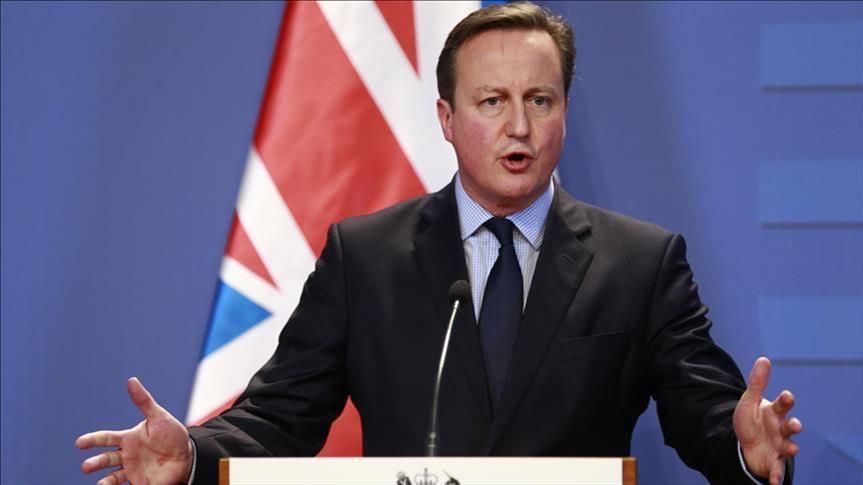
Ankara
By Gokhan Kurtaran
LONDON
Britain’s arrogant attitude towards other countries’ corruption, while it is largely beset with similar problems, has put the spotlight on the state of the U.K.’s own anti-corruption efforts.
Just two days before the Anti-Corruption Summit 2016, Prime Minister David Cameron’s remarks (into what he thought was a dead microphone) to Queen Elizabeth describing states such as Nigeria and Pakistan as “fantastically corrupt” spurred controversy.
Representatives of approximately 70 states are scheduled to meet Thursday in London for the Anti-Corruption Summit 2016.
But data and analyses from quite a few institutions and respected officials show that Britain is far from being in a position to point fingers at other states on fighting corruption.
London, Britain’s capital, is the largest global finance center without a doubt. According to the latest global financial centers index report prepared by Long Finance and Z/Yen groups, London outranked New York to secure the top spot.
But data and reports also show that money laundering, corruption, and tax avoidance are carried out through highly sophisticated methods in London.
The 2014 national risk assessment report from Britain’s National Crime Agency said that billions of pounds every year are laundered via local financial firms. The report stressed that most of this money laundering is carried out by local banks. Black money traders easily take advantages of the weaknesses of the system and authorities’ poor job performance.
“It puts beyond any doubt that vast sums of money from the proceeds of corruption around the world are flowing into the U.K., and our system for stopping it and preventing it isn’t fit for the purpose,” said Nick Maxwell, London Research Department director of the German-based Transparency International NGO.
Data from the Financial Secrecy Index (FSI) sheds light on the total amount of financial assets held in tax havens where no or very little tax is paid. According to the data, $21-32 trillion is stashed in tax havens unreachable by current tax systems. But those havens, such as the Cayman Islands, Virgin Islands, Jersey, and Bermuda, all connected to the U.K., also function as instruments to launder black money worth $1.6 trillion annually.
For example, the Cayman Islands is the world’s sixth-largest banking center, with assets reaching $1.4 trillion. Some 11,000 fund companies in Cayman Islands are forecasted to oversee net total assets of $2.1 trillion. Last month opposition Labour Party leader Jeremy Corbyn called on Cameron’s government to force those islands’ officials to fight tax avoidance and not become safe havens. He even proposed changing the self-governing regime in those islands to direct management.
“The point is that they are not independent territories. They are self-governing, yes, but they are British crown-dependent territories. Therefore, surely, there has to be an observance of U.K. tax law in those places.” Corbyn said.
Those criticisms followed shocking Panama Papers revelations showing that Cameron’s late father, Ian Cameron, had operated an offshore fund to avoid taxes.
Cameron’s father was an executive of Blairmore Holdings, which oversees investment funds. The leaks show there are also six lords and three former Conservative Party MPs cited in the Panama Papers.
Experts believe nearly 40 percent of the black money using the weaknesses of the U.K. to be laundered comes from Russia.
Net errors and omission calculation show that since the 1970s, approximately £133 billion has reached the U.K. system through unofficial means.
In a report released earlier this year – Dark matter: the hidden capital flows that drive G10 exchange rates – Deutsche Bank said there was strong evidence that a "good chunk" of Britain's 133 billion pounds ($201 billion) of hidden capital coming into Britain was of Russian origin.
Deutsche Bank’s Strategist at London said that last year nearly £1 billion ($1.47 billion) per month of unmonitored funds are invested in the U.K.
“A lot of that money goes into the housing market, especially the London housing market. These transactions are not recorded by the tax authorities, they are bringing cash in suitcases,” Winkler said.
"Unfortunately, the money bypasses the banks. It goes through offshore financial services; mailbox companies, etc. Not all the funds are derived from criminal activities. It’s just difficult to trace back,” he added, stressing that the Russians show great interest in the luxury real estate market.
Last year British multinational banking and financial services giant HSBC was seen helping rich clients avoid taxes in 10 countries and 30,000 accounts in documents leaked by the International Consortium of Investigative Journalists (ICIJ).
Last month’s Panama Papers leak also showed that HSBC continue to provide financial services to Rami Makhlouf, the cousin of Syrian regime leader Bashar Assad, despite the international sanctions on Syria.
French daily Le Monde also alleged that HSBC has established 2,300 companies through Mossack Fonseca, a law firm and corporate service provider in the thick of the Panama Papers scandal.
Taking into account British banks’ 2012 “Libor” scandal, such allegations are not to be downplayed or made light of.
In June 2012, the U.K. banking watchdog fined Barclays for manipulating the daily settings of the London Interbank Offered Rate (Libor) and the Euro Interbank Offered Rate (Euribor). The bank’s head, Bob Diamond, had to resign after the scandal.
After that, other banking groups suspected of involvement in similar scandals started to hold negotiations with the Financial Conduct Authority (FCA) about possible fines related to manipulation allegations.
Anadolu Agency website contains only a portion of the news stories offered to subscribers in the AA News Broadcasting System (HAS), and in summarized form. Please contact us for subscription options.

